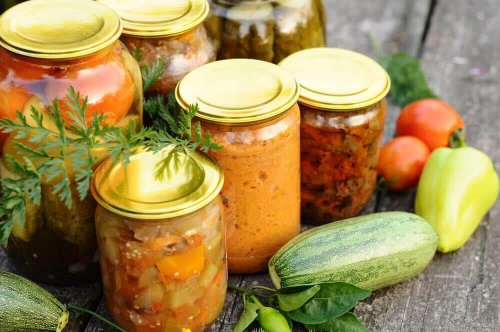Is it Healthy to Consume the Liquid in Canned Foods?


Written and verified by the nutritionist Saúl Sánchez Arias
Canning is an effective strategy that allows people to enjoy certain seasonal foods throughout the year. This way, you ensure their nutritional quality and correct food hygiene. On the other hand, it allows you to store surpluses at home and avoid the deterioration of certain products. But what about the liquid in canned foods? Is it healthy?
Sometimes, this liquid contains a good dose of beneficial micronutrients. Other times, however, it consists of additives or a lot of sodium that it’s best for you to avoid. In this article, we’ll teach you in what situations you should consume this liquid.
Canned fish
Regarding this type of food, the liquid that manufacturers usually use to guarantee the good conservation of products is usually oil. Therefore, and since fat-soluble vitamins dissolve in this medium, it’s advisable to take advantage of the liquid to avoid the loss of nutrients.
Vitamin D deficiency is endemic at the population level. Low values of this substance are associated with an increased risk of cardiovascular diseases, according to a scientific article published in 2016.
Oily fish such as tuna, which is usually eaten canned, is one of the few foods that provide significant doses of this vitamin. Therefore, discarding the oil inside the can means significantly reducing the supply of this necessary nutrient.
On other occasions, the liquid in canned fish consists of brine. In this type of situation, its consumption may not be as beneficial, since it can significantly increase sodium levels.
High sodium intake is linked to an increased risk of hypertension, according to an article published in the journal Nutrients. Therefore, you must take this into account when deciding whether or not to take advantage of the liquid in canned foods.
This article may interest you: Learn How to Make Delicious Tuna Fillings

Canned vegetables
Most of the canned vegetables include a liquid that consists of water, ascorbic acid, and, sometimes, salt. For this reason, their intake is practically harmless, unless you must regulate your daily sodium intake.
On many occasions, people discard this liquid because it can affect the organoleptic quality of the product, but not because it’s harmful to health itself.
However, it’s advisable to look at the labels to identify possible additives present in the product. If you identify the presence of preservatives beyond ascorbic acid, it’s recommended to consume this liquid in moderation.
Despite everything, people usually wash some types of canned vegetables, such as legumes, before using them in culinary preparations, because the liquid alters their palatability.
However, consuming the liquid in canned vegetables reduces the loss of water-soluble vitamins, such as B vitamins. This is because they could pass into this liquid during the preservation and heat treatment process.

Canned vegetables are recommended foods
Although experts prioritize the consumption of fresh foods over processed or packaged foods, you mustn’t forget that canned vegetables are a recommended product. They have almost the same nutritional properties as their fresh varieties and the organoleptic quality is very acceptable.
In addition, they allow you to consume non-seasonal foods. Also, they allow you to have enough reserves of products for regular consumption without having to go to the supermarket so often. In addition, their price is usually very competitive.
You should also read: Food Additives – Allergies, Symptoms, and Treatments
What you should remember about the liquid in canned foods
Experts highly recommend the consumption of canned foods as part of a healthy diet. Generally, you can consume the liquid in canned foods, as it’s harmless.
Nevertheless, it’s important to analyze the foods labels. If you detect any preserves with a lot of preservatives, beyond sodium or ascorbic acid, you must limit the intake of the packing liquid.
However, this is unusual, and it’s common for manufacturers to can foods in brine, and that would only be harmful to hypertensive patients.
All cited sources were thoroughly reviewed by our team to ensure their quality, reliability, currency, and validity. The bibliography of this article was considered reliable and of academic or scientific accuracy.
- Wang TJ., Vitamin D and cardiovascular disease. Annu Rev Med, 2016. 67: 261-72.
- Grillo A., Salvi L., Coruzzi P., Salvi P., Parati G., Sodium intake and hypertension. Nutrients, 2019.
This text is provided for informational purposes only and does not replace consultation with a professional. If in doubt, consult your specialist.








